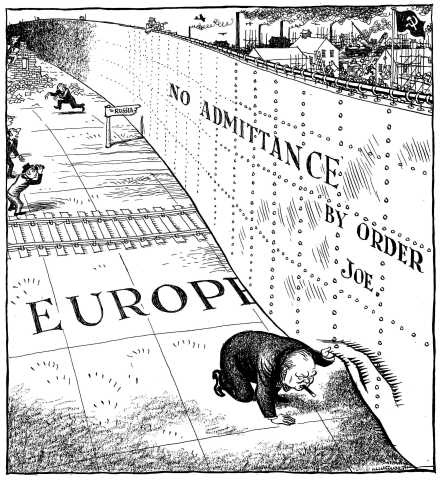|
|
||
|
One of the most controversial, remembered and formative speeches of the post-war years. MP and historian Roy Jenkins, Why Churchill’s Speech was ‘A Shot Which Rang around the World’ (2002).
In February 1946, Stalin gave a speech for the Russian elections (it is often called the 'Bolshoi speech' because he made it at the Bolshoi Theatre in Moscow). It contained the normal Communist attacks on capitalism, but included one sentence in which Stalin claimed: 'world capitalism proceeds through crisis and the catastrophes of war'. American politicians took it as a threat.
The Long TelegramThe American State Department asked the American Embassy in Moscow for an analysis of Soviet policy. Their question was answered by George Kennan, an Embassy official who had lived in Moscow since 1933, and who hated Communism and the Soviet system. Kennan's 8,000-word reply - nicknamed 'the Long Telegram' - advised:
|
Going DeeperThe following links will help you widen your knowledge: Interview with Clark Clifford, who at the time was a White House Counsellor, about the speech and its repercussions
Did You Know?Churchill was so worried about Soviet domination of eastern Europe that towards the end of World War II he tried to get the British armies to advance faster. To try to do so, in 1944, he dropped British paratroopers behind enemy lines at Arnhem – but they were surrounded and defeated. This story was told in the film, A Bridge Too Far.
|
|
The Fulton SpeechOn 5 March 1946, on the invitation of President Truman, Winston Churchill went to Fulton in America and gave a speech. He said ‘a shadow’ had fallen on eastern Europe, which was now cut off from the free world by ‘an iron curtain'. Behind that line, he said, the people of eastern Europe were ‘subject to Soviet influence . . . totalitarian control [and] police governments’.
Source AMr Churchill has called for a war on the USSR. Stalin, writing in the Russian newspaper Pravda in March 1946. Source BThe Cold War set in. Churchill had given his famous speech in Fulton urging the imperialistic forces of the world to fight the Soviet Union. Our relations with England, France and the USA were ruined. Khrushchev, writing in 1971. In 1946 he had been a member of the Soviet government. Source CThis cartoon from 1946 by the British cartoonist Illingworth was published in the Daily Mail on 6 March 1946 (the day after Churchill's Fulton speech). It shows Churchill having 'a peep under the Iron Curtain'. ‘Joe’ is Joseph Stalin. In fact, the ‘iron curtain’ was a 2,000-km line of barbed wire, look-out posts and road blocks. Click here for the interpretation
|
Consider:1. Explain how Churchill’s speech was a turning point in the history of the Cold War. 2. Is it true to say therefore that Churchill caused the Cold War?
Did You Know?There is a story that Churchill was once invited to France give a speech about his past, a speech which - despite his limitations with the language - he insisted on delivering in French. He began: "Quand je regard mon derrière, je vois qu'il est divisé en deux pars".
|
|
|
| ||
